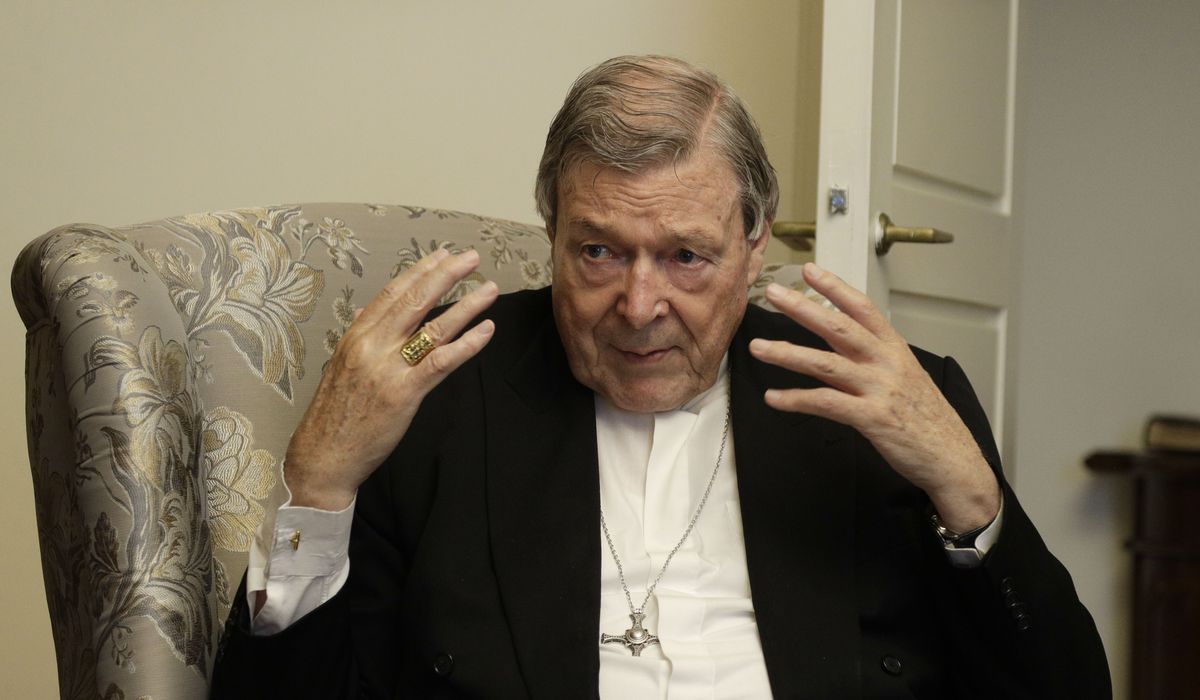
Cardinal George Pell has weathered travails that would try the faith of Job.
Wrongly convicted of sexually abusing two teenage boys in the 1990s, the former chief financial officer of the Vatican was sentenced to prison in Australia, where he was held in solitary confinement for 404 days before being exonerated in April 2020.
And like Job, Cardinal Pell — who turns 80 on Tuesday — has kept the faith.
“I’m a Christian. I believe in God. I actually believe [God is] the Creator. God is also a judge. And I always regarded that as the most important test. I had to take on these issues; My conscience was clear,” the cardinal told The Washington Times in a video-conference interview. “And I never lost the support of my family and my friends. So these things were a greater support to me, even though there was no underestimating the humiliation and the fall from grace that accompany somebody who’s put into solitary confinement in a prison.”
Throughout his ministry, Cardinal Pell has been known for his adherence to church doctrine, and his trials have not vitiated his views. He said pro-abortion politicians who are members of the Roman Catholic Church shouldn’t go forward to receive Holy Communion at Mass.
“I would say to these people, ‘If you’re regularly supporting pro-abortion legislation and you don’t see anything wrong with that, I really don’t think you should present yourself for Communion,” he told The Times.
His comments place him squarely on the conservative side of a thorny issue that has divided American bishops. The U.S. Conference of Catholic Bishops reportedly will consider measures to deny the Eucharist to pro-choice politicians during its June 16 annual meeting, even though the Vatican has warned against such action.
A restriction on Communion for pro-abortion politicians would affect mostly Democrats such as President Biden, House Speaker Nancy Pelosi, Virginia Sen. Tim Kaine and New York Gov. Andrew Cuomo, among others. There are 158 Catholics in Congress, most of them Democrats who favor abortion rights, and six Catholic Supreme Court justices, most of them anti-abortion Republicans, according to The Associated Press.
Some church leaders, such as Cardinal Wilton Gregory, archbishop of Washington, are calling for opening a dialogue with pro-choice politicians of the faith, while others call for a harder line.
“The basic teachings are very clear,” Cardinal Pell said. “Communion is not like offering people a cookie and a cup of coffee, right? It is faith, that when a person goes to receive Communion, it’s … that they believe they’re receiving the body and blood of Christ, not just something metaphorical. And they also believe that in a rudimentary sense, they’re worthy [to partake of the sacrament].”
He said, “The Church never asks people when they’re presenting [themselves] for Communion what the state of their soul is, whether they have just repentant, been to conversion, whether they’re worthy, [but] you presume that the question is different when somebody has taken a public stance.”
A spokeswoman for the U.S. Conference of Catholic Bishops said the group “would respectfully decline comment” on Cardinal Pell’s statement.
During his confinement, Cardinal Pell had none of the trappings of his former life in the Vatican. Instead, he was in an 8-foot-by-11½-foot cell for 23 hours each day, allowed only one hour of exercise.
“I was quite confident that I was going to be released eventually, even if it was after three or four years,” he said. “But I didn’t know when, and I never turned my mind much to what I might do when I was freed, because that would depend on the which terms I was freed, whether I was freed as a man who was innocent or guilty.”
He acknowledged that he “played something like the role of scapegoat” with the 2019 conviction seen as a way of making sure “somebody takes a knock for the church” over a series of sexual abuse scandals. He said Australia’s highly secular culture also might have contributed to public attitudes.
“We Catholics, similar to the United States, are a minority, about a quarter were less than a quarter of the population at the moment,” Cardinal Pell said of the church in his native land. “As in the United States, there is a traditional anti-Catholicism [and some] want to poison public opinion against the church, particularly, was the pedophilia scandal, which was run, then rerun. And there was a royal commission in Australia for four or five years, which, in most cases, resurrected cases which had been dealt with before, [but] not always.”
His memories were some of the things he relied on in prison. Cut off from other inmates, with no opportunity to minister to those in need, he had to develop a new daily routine.
“I think I certainly maintain my sanity and my equanimity. I had a daily routine,” Cardinal Pell recalled. “I got up, dressed, [and] ate breakfast. I watched a morning sunrise [television] program and enjoy it. Got my prayers said the official prayers of the church did my meditation. I had two periods of exercise a day and the main meal around 11 or 11:15.”
He said his evening meal would arrive “at 3:30 in the afternoon, so the staff could knock off work and go home.”
Evenings centered on watching the evening news and some television — “I had was very little television during my life, I watched more television than the rest of my life put together,” he explained — and then “I would write [in] my diary every night.”
Those diaries formed the basis for his first two “Prison Journal” books, released in the U.S. by Ignatius Press, with the third and final volume due in October.
Cardinal Pell said encouraging messages from Pope Francis, as well as Emeritus Pope Benedict XVI, and the Vatican secretary of state, Cardinal Pietro Parolin, helped sustain him. He also received, and answered, 4,000 letters from others around the world. Most writers, but not all, were Catholics and offered support.
The cardinal said he gained “one very basic lesson” from his case.
“I’m happy to say as you know, the Christian package works,” he said. “I believe in God, I believe in Jesus as the Son of God, in the usefulness and beauty of His teaching. The teaching about redemptive sacrifice that when things go very badly, wrong, tragedies and a family sickness, injustice like this, that we can offer up our suffering, join it with Christ, and somehow believe in the great scheme of things good can come from [it]. That’s a great consolation.”







